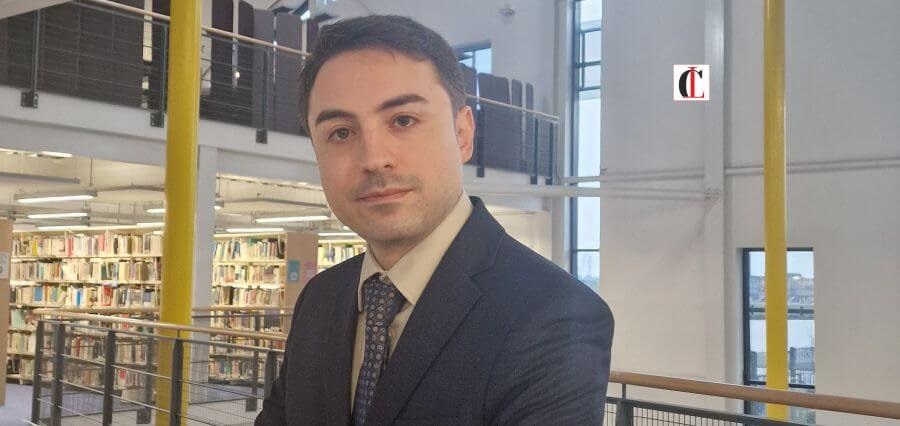The integration of artificial intelligence and machine learning is redefining industry standards and enhancing operational competencies. Organizations are increasingly harnessing these tools to analyze vast amounts of data, streamline processes, and foster innovation. The evolution of AI technology is proving to be a cornerstone in driving transformation across various sectors, from enhancing organizational performance to improving customer experiences and managing complex systems.
Dr. Mohammad Hossein Amirhosseini, a figure of renown in the field, is celebrated for his leadership in bridging the gap between AI advancements and practical applications. As an Associate Professor in Computer Science and Digital Technologies, his dedication to advancing both research and education is truly inspiring.
His expertise goes beyond technical proficiency, encompassing a profound understanding of how AI can be applied to solve complex problems and improve interdisciplinary outcomes. Dr. Mohammad’s approach is marked by a commitment to integrating cutting-edge technologies into his academic work, driving forward-thinking research, and mentoring the next generation of AI professionals.
The University of East London, under Dr. Mohammad’s guidance, has made substantial contributions to the field. It has developed impactful programs and research initiatives that are truly impressive, advancing technological understanding and addressing contemporary challenges in digital technologies.
Let’s explore how Dr. Mohammad is shaping the future of AI and digital technologies with his groundbreaking research and innovative teaching methods:
From IT Industry to Academic Excellence
Before transitioning to academia, Dr. Mohammad worked in the IT industry, where he recognized that data is the most valuable asset for companies and organizations today, and AI and machine learning are the most powerful tools to unlock their potential.
During his BSc and MSc studies, Dr. Mohammad was introduced to various AI-related modules and completed several projects that fueled his interest in the field. This combination of industry insight and academic experience, along with his passion for solving complex problems and the transformative potential of AI, led him to pursue a PhD and a career in academia.
After completing PhD in Computing at London Metropolitan University in 2018, he served as a Postdoctoral Research Fellow at the same institution and contributed to the SPIRIT (Scalable Privacy Preserving Intelligence Analysis for Resolving Identities) project under the European Horizon 2020 framework, involving a consortium of 17 partners from 9 European countries.
In April 2020, Dr. Mohammad joined the University of East London as a lecturer in Computer Science and Digital Technologies. His career progressed to Senior Lecturer in 2023, and he was promoted to Associate Professor in 2024.
Dr. Mohammad shares, “Throughout my academic journey, my focus has evolved from foundational Al research to exploring its interdisciplinary applications, particularly in psychology and healthcare.” This evolution has deepened his commitment to advancing the field through impactful research, innovative teaching, and mentoring the next generation of Al professionals.
Enhancing Organizational Efficiency and Mental Health Through Technology
During his MSc final project, Dr. Mohammad concentrated on Neuro-Linguistic Programming (NLP), a psychological method, to investigate its potential to enhance project and knowledge management within organizations.
His research revealed a significant connection between NLP and organizational efficiency, which helped him frame his PhD proposal on the results of his MSc dissertation. Dr. Mohammad states, “My aim was to apply artificial intelligence and machine learning techniques to automate various elements of this psychological approach, ultimately improving organizational performance.”
During his PhD, Dr. Mohammad began teaching and observed that students struggling with mental health issues faced difficulties with assignments, coursework, and exams, underscoring the substantial impact of mental health on quality of life. His background in Al and his knowledge of effective psychological tools led him to broaden his research into various aspects of psychology.
His enduring interest in human behavior, influenced by his mother’s career as a psychiatrist, was also a key factor in this decision. This blend of personal and professional experiences inspired him to further explore the intersection of Al and psychology.
Throughout his academic career, Dr. Mohammad has focused on human personality, employing machine learning to predict personality types. His research has included cognitive processing and the detection of symptoms related to anxiety, depression, autism, and ADHD.
Additionally, he has investigated the automation of tools for personal development, coaching, therapy, and mental health management. His collaborations with industry partners and higher education institutions have led to impactful publications and significant research contributions.
His involvement in the SPRIT project during postdoctoral research broadened his expertise to include cybersecurity and identity resolution, incorporating psychological dimensions. This experience allowed him to apply Al in fields such as identity resolution, cybersecurity, and fraud detection.
Moreover, supervising a diverse range of BSc, MSc, PhD, and professional doctorate projects, along with industrial collaborations, has facilitated the exploration of Al applications across various domains, including Natural Language Processing, social media analysis, finance and fintech, lithium battery manufacturing and recycling, hate speech, racism, and sexism detection and prevention, politics and international relations, and animal behavior and personality.
Multifaceted Role Driving Excellence in Education
Dr. Mohammad accomplishes various roles. He serves as the Apprenticeship Lead for the School of Architecture, Computing, and Engineering and as the Course Leader for both the BSc and MSc Digital and Technology Solutions Apprenticeship programs. He also led multiple modules across various levels and has supervised a substantial number of MSc and BSc dissertations. Additionally, Dr. Mohammad is the lead supervisor for several PhD and Professional Doctorate researchers.
His contribution extends beyond teaching and supervision to include university-wide responsibilities. He serves as the School Representative on the Education and Experience Committee and the University Apprenticeship Compliance Committee.
Furthermore, Dr. Mohammad has held the roles of Year Tutor for all BSc final-year students in the Department of Computer Science and Digital Technologies and Academic Link Tutor for Dual Degree Computing courses offered through the University’s international partners.
Dr. Mohammad ensures high-quality education by staying current with the latest industry trends and integrating them into his curriculum. He employs innovative teaching methods, such as project-based learning and continuous assessment, to engage students actively.
Additionally, he prioritizes personalized feedback and mentorship to support students’ individual growth and learning. Regularly collaborating with industry partners and colleagues ensures that his curriculum remains relevant, practical and aligned with professional standards.
Dr. Mohammad shares we adhere to rigorous standards and frameworks to maintain excellence in higher education and undergo regular internal audits and external inspections by key regulatory bodies, including Ofsted, Ofs, QAA, and the ESFA.
Leveraging Global Collaborations for Societal Benefits
“Before starting any research project, I always consider how the outcomes can benefit the research community and address existing knowledge gaps,” Dr. Mohammad stated. He firmly believes that research should lead to tangible, impactful products that can be utilized by society.
Dr. Mohammad has established significant national and international collaborations with esteemed institutions such as the University of Pennsylvania, Imperial College London, the University of Lincoln, London Metropolitan University, and Adelphi University. These partnerships have resulted in impactful publications in prestigious Q1 journals, including Nature Scientific Reports, and presentations at renowned conferences such as the IEEE World Congress on Computational Intelligence.
Dr. Mohammad has also collaborated with various national and international industrial partners, including Whyness Ltd, Nex Power Ltd, Solve Energy Service Ltd, Keptika Ltd, Accenture, Uptime Labs Ltd, and Dogvatar Ltd. These collaborations have led to successful grant applications, such as the Innovate UK Smart Grant, and have produced high-quality publications in Q1 and Q2 journals and top-tier conferences, as well as the development of commercially viable products.
Global Recognition and Impact
Dr. Mohammad’s research has gained international attention, resulting in interviews with major media outlets like CBS News, Fox TV and German Public Radio. His work has also been featured in prominent publications, including The Telegraph, Science Magazine, Mirage News, Study Finds, EurekAlert!, SciTechDaily, BNN, Med India, and more.
Dr. Mohammad has also been invited as a guest speaker by various universities and events to discuss different aspects of Artificial Intelligence and its applications.
Dr. Mohammad has received the Staff Award for ‘Innovative Teaching’ in 2022, ‘Leadership through Change’ in 2023, and ‘Student Experience’ in 2024 for his contributions to academia. Additionally, under his leadership, the University of East London was awarded the prestigious 2024 AAC National Apprenticeship High Commendation Award for ‘Digital Apprenticeship Provider of the Year’ for the Digital and Technology Solutions Apprenticeship course.
Strategic Integration of Teaching and Research
Dr. Mohammad balances his teaching responsibilities with research activities by carefully managing his time and aligning both roles strategically. He integrates his research into teaching, using current projects and findings to enrich classroom discussions.
In interdisciplinary research, Dr. Mohammad collaborates closely with colleagues to share workloads and set clear timelines, ensuring that both teaching and research receive the attention they need. This approach allows him to stay productive and engaged in both areas.
Future of Interdisciplinary Research and Education
Dr. Mohammad shares, “In the next few years, AI and machine learning will become more integrated into everyday applications, with advancements in areas like generative AI, natural language processing, and ethical AI.”
These developments will enable him to explore more complex and interdisciplinary research, particularly in areas like healthcare and psychology. In teaching, Dr. Mohammad continuously updates the curriculum to incorporate these emerging technologies, ensuring students are equipped with the latest knowledge and skills to thrive in this developing field.
Innovative Teaching Strategies that Empower Students
Dr. Mohammad observed, “Project-based learning and the flipped classroom model are highly effective in engaging students in Computer Science.” “These methods encourage hands-on experience and active participation, allowing students to apply theoretical knowledge to real-world problems,” he added. He also emphasizes continuous assessment and feedback, which help students track their progress, identify areas for improvement, and stay motivated.
Additionally, integrating emerging technologies and interdisciplinary examples keeps the content relevant and exciting, while interactive tools and gamification make learning more engaging and enjoyable. These innovative methods not only engage students but also equip them with the skills and mindset needed to thrive in the field of Computer Science.
Commitment to Technological Advancements and Academic Excellence
Dr. Mohammad inhabits the latest developments in technology by regularly reading academic journals, attending conferences and engaging with industry professionals. He continuously updates his curriculum to reflect new trends and integrate emerging technologies into his research. By actively seeking feedback from students and collaborating with colleagues, he ensures that his teaching and research remain relevant, impactful, and aligned with the changing needs of the field.
Strategic Approach for Aspiring Al Researchers
For aspiring academics and researchers in Artificial Intelligence, Dr. Mohammad advises focusing on building a solid foundation in mathematics, programming, and core Al concepts. “Stay curious and continuously learn by keeping up with the latest research and emerging technologies,” he quoted.
Dr. Mohammad suggests, “Engage in interdisciplinary projects to broaden your perspective and apply Al to real-world problems.” “Collaborate with peers and mentors and share your work through publications and conferences,” he added. “Always consider the ethical implications of your work, ensuring that your research contributes positively to society,” Dr. Mohammad quoted.
Pioneering Ethical Al in Academia
Dr. Mohammad aims to advance the field of Artificial Intelligence in academia by conducting impactful, interdisciplinary research and contributing to the development of ethical AI systems. He plans to continuously explore innovative applications of Al, mentor the next generation of researchers, and foster collaborations that bridge academia and industry. “I aim to influence the curriculum to ensure that students are well-prepared to address both the technical and societal challenges posed by AI,” he quoted.

